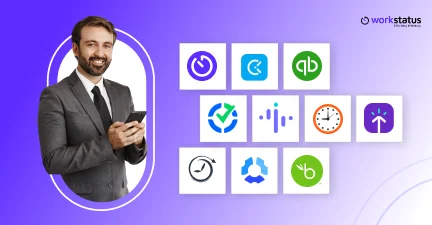Table of Contents
Introduction
Time is the currency of productivity, and in the fast-paced world of 2024, managing it efficiently is more crucial than ever.
Did you know?
More than 80% of organizations cite effective time tracking as a key factor in boosting operational efficiency and achieving better results.
The reliance on manual time-tracking methods is diminishing. Most of the companies are shifting towards automated time-tracking systems.
These tools not only streamline work processes but also significantly reduce the margin of error in time calculation.
In this blog post, we discover the top-rated work time tracker tools for 2024 that are transforming the way companies monitor and optimize their employees’ time.
Join us as we discuss these tools, each with features designed to empower organizations to track, manage, and analyze work time effectively.
Let’s dive in.
The Pitfalls Of Traditional Time-Tracking Methods
Here are some major challenges with traditional time-tracking methods:
1. Human errors
When writing down hours, mistakes were bound to happen.
Sometimes, in the rush or fatigue, people might forget to log hours or accidentally note down the wrong time, leading to miscalculations in work hours.
2. Time consumption
Manually recording and calculating hours took a ton of time and effort.
Imagine spending a chunk of your workday just writing down hours instead of actually doing productive work!
3. Limited accuracy
These old-school methods weren’t always accurate. It was tough to accurately track things like breaks or time spent on different tasks.
This lack of precision could mess up payroll and project estimates.
4. Difficult reporting
Making reports or sharing time records was a headache, too. Collecting and organizing data all that time was tedious and error-prone.
It was like solving a puzzle without all the right pieces.
5. Lack of flexibility
Traditional methods needed more flexibility. They couldn’t adapt smoothly to changing work patterns or locations.
This was a big issue for remote workers or those with flexible work arrangements.
These problems made relying on traditional time tracking methods a hassle for employees and employers.
Thankfully, modern solutions have swooped in to fix these headaches!
What Are Work Time Tracker Tools?

Work time tracker tools are helpful assistants that closely monitor how much time you spend working. They’re unique apps or software that help you track when you start working, take breaks, and finish work for the day.
These tools usually come with features that let you:
Clock In and Out: You can start and stop a timer when you begin and finish your work. It’s like having a digital punch card!
Record Breaks: They keep tabs on when you take breaks during work. It’s essential to take breaks, right?
Organize Tasks: Some tools let you assign different tasks or projects and track the time you spend on each. This helps you know how much time you’re spending on other things.
Generate Reports: They help you download reports about how you’ve spent your time. These reports can be useful for bosses or for yourself to see where your time goes.
Reminders and Alerts: Some tools remind you to take breaks or notify you when you’ve been working for some time. It’s like having a helpful friend who keeps you on track!
These tools are handy for people who work on computers or have jobs where it’s essential to keep track of time. They make it easier to manage your time and stay organized while working.
Top 5 Benefits Of Work Time Tracker Tools
Here are some significant benefits of work time tracker tools for you:
1. Improved time management
- Work time tracker tools empower you to manage your time more effectively.
- You gain insight into where your time goes by keeping a precise record of the hours spent on tasks and projects.
This knowledge helps prioritize tasks, allocate time efficiently, and avoid distractions, ultimately enhancing productivity.
2. Enhanced productivity
- These tools act as productivity boosters by promoting accountability and focus.
- When you track your work time, you become more aware of your daily use.
This awareness encourages better time allocation, minimizes procrastination, and encourages a more concentrated and productive workflow.
3. Accurate billing and invoicing
- Work time tracker tools are invaluable for freelancers, consultants, or businesses that bill clients based on time spent.
- They provide accurate records of billable hours, ensuring fair and precise invoicing.
It helps build trust with clients and eliminates billing disputes.
4. Insightful reporting and analysis
- Work time tracker tools generate detailed reports showcasing how time is allocated across various tasks and projects.
These insights offer a clear overview of productivity trends, identify time-consuming activities, and aid in making informed workflow optimization and resource allocation decisions.
5. Employee accountability and transparency
- In a team setting, these tools foster accountability and transparency. Managers can monitor team members’ progress, track project timelines, and identify potential bottlenecks.
- Additionally, employees can showcase their efforts and demonstrate their contributions through accurate time records.
Employing work time tracker tools brings many advantages, from enhancing personal productivity to fostering transparency within teams and ensuring fair billing practices in business dealings.
14 Ultimate Work Time Tracker Tools 2025
Here is the list of best work time tracker tools of 2024:
1. Workstatus

WorkStatus is a robust work time tracking tool for architects, designers, etc. that optimizes productivity and fosters team collaboration. With features like precise time tracking, project management, and insightful analytics, it aids in better resource allocation and project delivery. Its remote work monitoring capabilities ensure accountability without compromising privacy.
The platform’s integration options and customization abilities make it adaptable to diverse business needs.
Workstatus stands out for enhancing productivity, transparency, and efficient remote team management in a user-friendly interface.
It offers various features that cater to the needs of individuals, teams, and organizations across multiple industries.
Key Features:
- Time Tracking
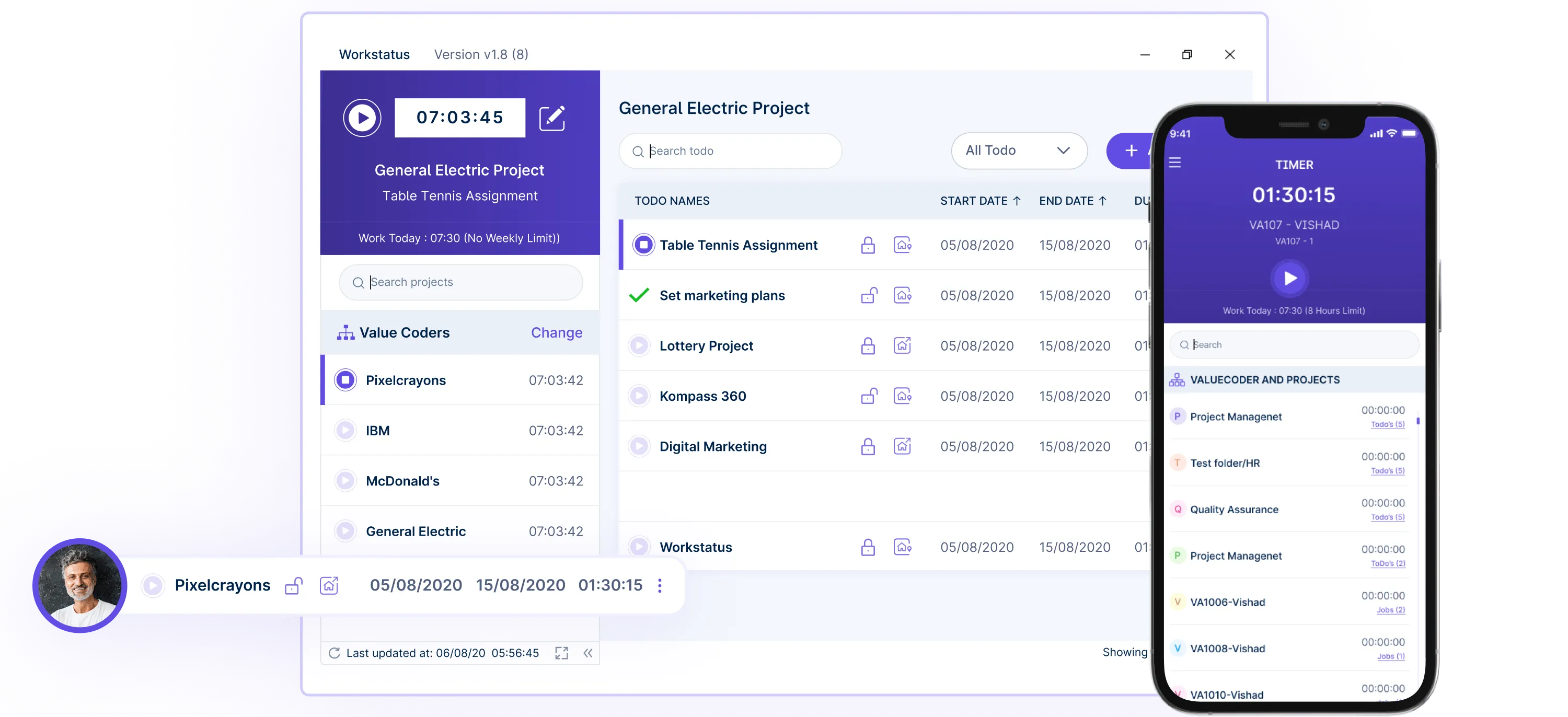
Workstatus allows users to track time spent on specific tasks and projects.
It enables precise monitoring of work hours, breaks, and billable hours, aiding in accurate project costing and billing.
- Project Management
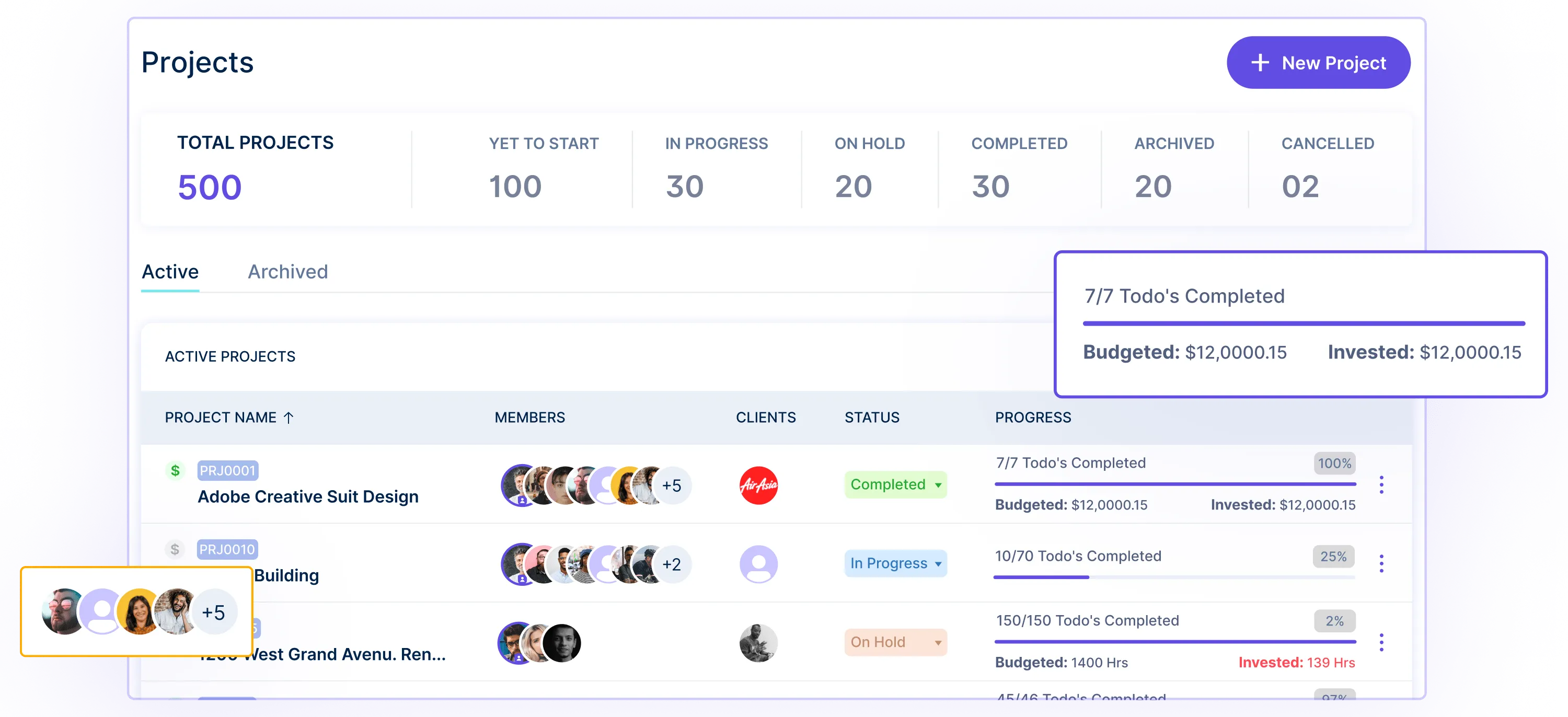
The platform facilitates efficient project management by organizing tasks, setting deadlines, assigning responsibilities, and tracking progress.
It offers a centralized space for teams to collaborate, share files, and communicate effectively.
- Reporting and Analytics
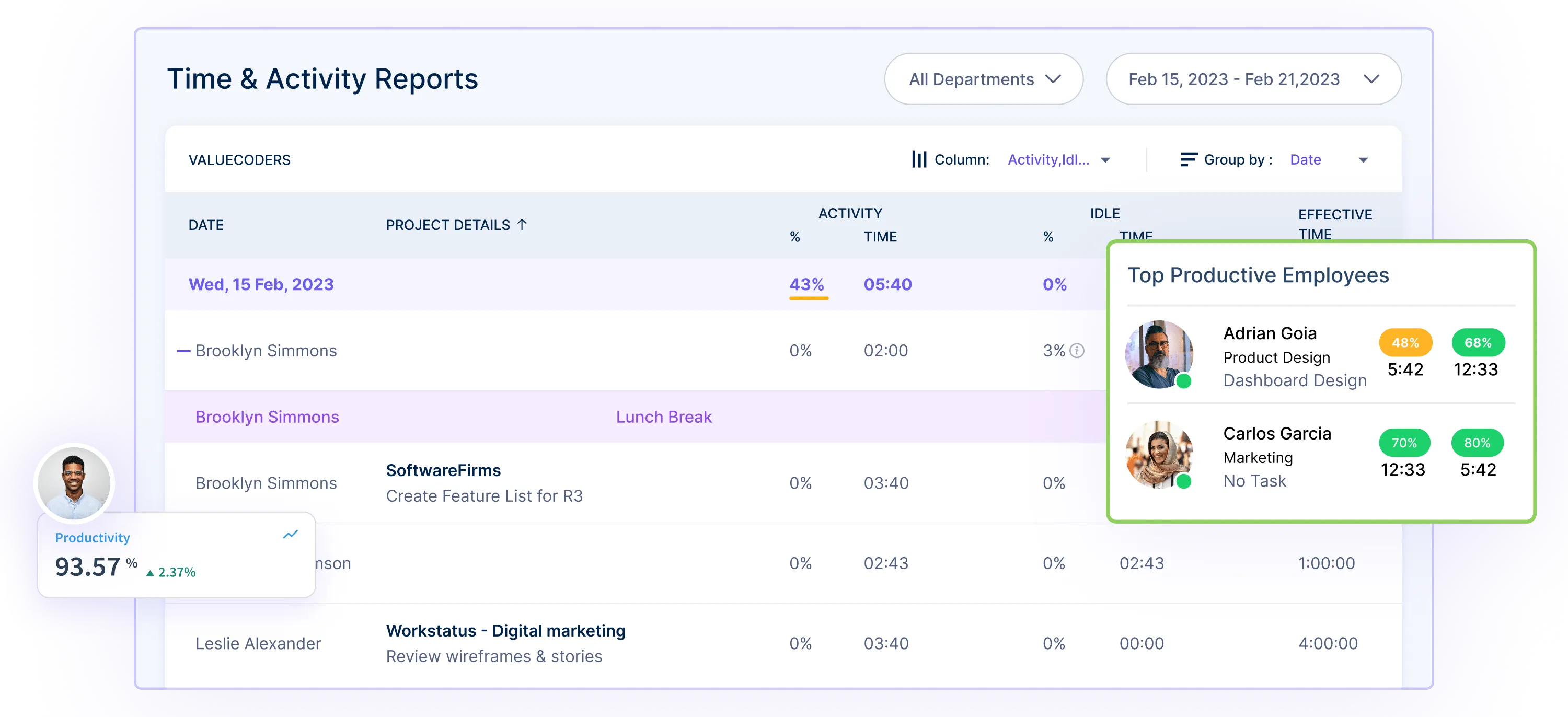
Workstatus generates detailed reports and analytics based on tracked data.
Users can gain insights into productivity patterns, time allocation, and project timelines, enabling informed decision-making and resource optimization.
- Invoice Management
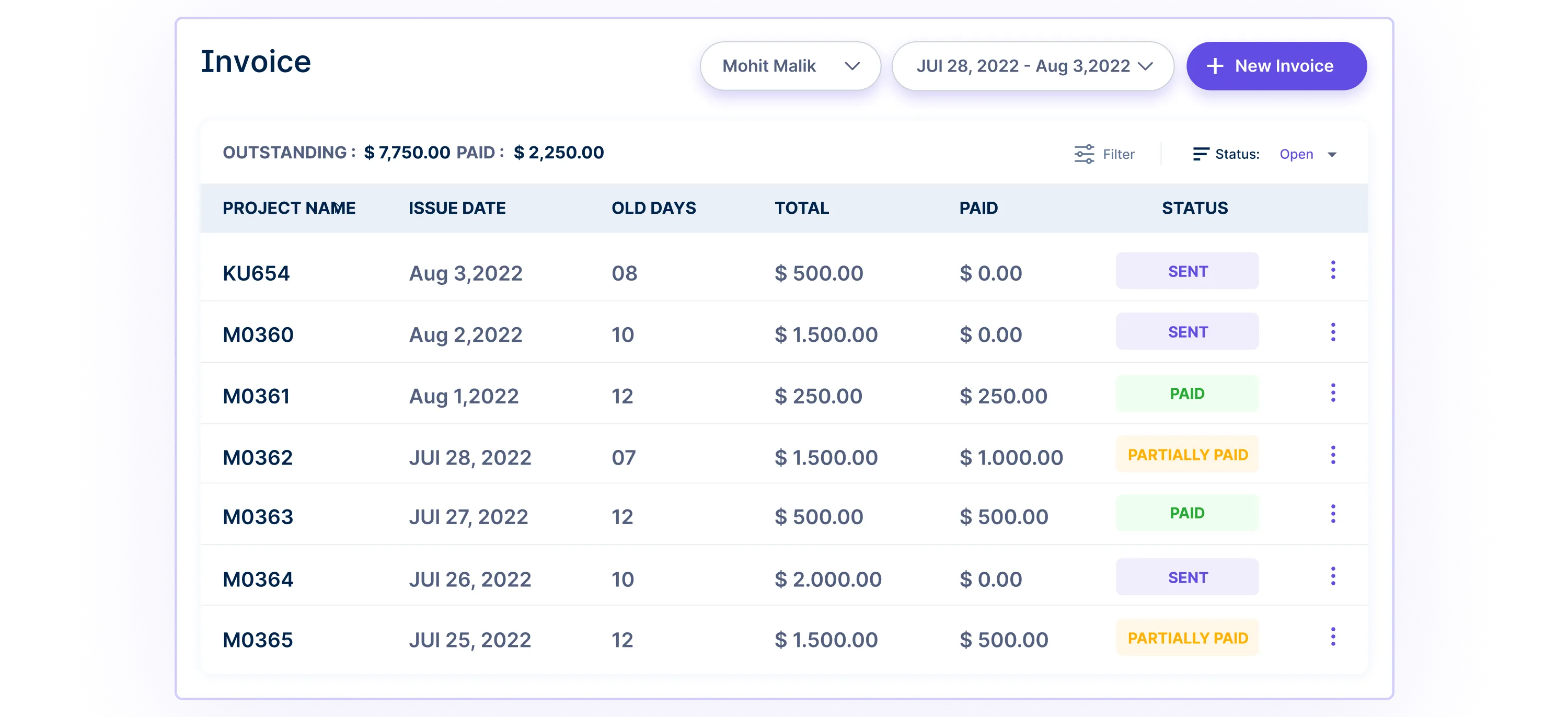
Workstatus allows users to generate invoices based on tracked time, tasks, and project progress.
Get detailed breakdowns of billable hours, expenses, and project-specific charges, ensuring transparency and accuracy in client billing.
- User Activity Monitoring
![]()
Workstatus provides insights into apps & websites visited, active hours, tasks completed, and time spent on various projects or assignments.
It promotes accountability, helps identify productivity patterns, and ensures efficient resource allocation by monitoring individual and collective workloads.
2. Invoicera
Invoicera is a powerful online invoicing software equipped with built-in time tracking capabilities. Designed for freelancers, small businesses, and enterprises, Invoicera simplifies financial processes by combining time tracking, invoicing, expense management, and client communication into a single platform.
It helps streamline billing cycles, track employee time, manage projects, and automate recurring invoices, making it a versatile solution for organizations aiming to improve accuracy and productivity.
Invoicera is known for its automation features, multi-currency and multi-language support, and extensive customization options, allowing businesses to tailor the platform to their unique workflow needs.
It serves as a centralized hub for managing time, projects, and financial transactions efficiently.
Key Features:
Time Tracking
Invoicera’s time tracking software lets users monitor the time spent on individual tasks, clients, or projects.
It ensures accurate billing by linking tracked hours directly to invoices, reducing manual errors and ensuring transparency in client interactions.
Online Invoicing
As a leading online invoicing software, Invoicera allows users to create, send, and manage invoices easily.
It supports recurring invoices, automatic payment reminders, and custom invoice templates to enhance brand identity and client communication.
Expense Management
Track and categorize expenses effortlessly with Invoicera.
Users can link expenses to specific projects or clients, improving budget control and ensuring complete financial visibility.
Project Management
Invoicera offers tools to assign tasks, set deadlines, and monitor progress within projects.
Time entries and expenses can be directly associated with projects to enhance accuracy in costing and reporting.
Client & Staff Management
Manage multiple clients and staff accounts from one dashboard.
Set roles, permissions, and workflow rules to maintain control and ensure efficient operations across departments.
3. Clockify
Clockify is a simple work time tracking tool for individuals and teams.
It offers a free version with essential time-tracking features and supports unlimited users, projects, and reports.
Clockify helps users manage their time effectively and gain insights into their productivity patterns.
Read more – Workstatus vs. Clockify vs. Toggl- The Ultimate Battle to become the Best App for Time Tracking
4. Zoho Projects
Zoho Projects offers time-tracking functionality within its project management suite.
It enables users to log hours, track project progress, and collaborate seamlessly with team members. Zoho Projects’ integrated approach ensures efficient project planning, execution, and delivery.
5. RescueTime
RescueTime is a productivity tool that tracks users’ computer usage and provides detailed insights into time spent on different applications and websites.
It categorizes activities as productive or distracting, helping individuals analyze their habits and adjust to optimize their time and focus on the tasks that matter most.
6. Time Doctor
Time Doctor focuses on improving productivity by offering time tracking and employee monitoring features.
It lets users track time spent on tasks, monitor web and app usage, and generate reports to understand how time is utilized.
Its emphasis on accountability helps remote teams stay focused and efficient.
Read More – TimeDoctor vs Clockify vs Workstatus : A Complete Comparison
7. Everhour
Everhour integrates with popular project management tools such as Asana, Trello, and Basecamp, enabling users to track time directly within these platforms.
It provides detailed time reports, budgeting tools, and team collaboration features, making it a valuable asset for project-based businesses aiming for streamlined time management.
8. ClickUp
The next tool is ClickUp. It is a project management tool with time tracking capabilities.
It allows users to track time against tasks and projects within the platform, enhancing collaboration and productivity.
ClickUp’s customizable features and integrations make it suitable for diverse team workflows.
You may also like: Best ClickUp Alternative Tools
9. Paymo
Paymo offers tools, including time tracking, task management, and invoicing, catering to freelancers and small to medium-sized businesses.
Users can track time spent on tasks, manage projects, and seamlessly create invoices based on billable hours, streamlining project management and billing processes.
10. DeskTime
DeskTime combines automatic time tracking with employee monitoring features.
It provides insights into productive hours, internet usage, and application tracking, empowering businesses to analyze work patterns and optimize productivity.
Its data-driven approach helps organizations improve their work efficiency.
Read More – Workstatus vs. TimeDoctor vs. DeskTime – A Comparative Analysis
11. Wrike
Wrike integrates project management with time tracking, allowing teams to plan and monitor tasks effectively.
With tasks prioritization, real-time collaboration, and time tracking, Wrike helps teams stay organized and focused on achieving project goals within specified timelines.
12. Timely
Timely simplifies time tracking and scheduling with its automatic tracking capabilities.
It records time spent on different tasks and projects, creating comprehensive reports that help users review their daily activities and plan their time more efficiently.
Its calendar-based interface makes scheduling and time management hassle-free.
13. ActivTrak
ActivTrak is a time tracking app for employees designed specifically for macOS users.
It automatically tracks time spent on various tasks and applications, categorizing activities for detailed insights into productivity.
Its visual timeline feature allows users to review their computer usage and optimize workflow.
14. ProofHub
ProofHub combines project management with time tracking capabilities. It provides a single platform for teams to track time, collaborate, and manage tasks efficiently.
With features like Gantt charts, time tracking, and discussions, ProofHub streamlines project workflows and enhances team productivity.
Choosing The Right Work Time Tracker
Choosing the right work time tracker is essential to help you manage your time and tasks effectively. Here are simple steps to consider:
1. Identify Your Needs: Understand what you need the tracker for – whether it’s for personal use or a team. Consider features like ease of use, reporting, integrations, and whether it’s for tracking billable hours or just personal productivity.
2. Ease of Use: Look for a tool that’s easy to navigate and understand. A user-friendly interface will make tracking time simpler without adding extra stress.
3. Compatibility: Ensure the tool works well with your devices and integrates with the apps or software you use daily. This compatibility will make tracking time seamless.
4. Features That Matter: Focus on the features that matter most to you. Do you need detailed reports, reminders, or invoicing capabilities? Go for the one that meets your specific needs.
5. Budget: Consider your budget. Some tools offer free versions or trials, while others might require a subscription. Decide on a tool that provides value within your budget constraints.
6. Reviews and Recommendations: Check reviews and seek recommendations from peers or online communities. Real user experiences can offer insights into how well a tool functions in real-life situations.
7. Support and Updates: Look for a tool with good customer support and regular updates. This ensures that if you encounter any issues or need help, there’s assistance available.
Considering these factors, you can find a work time tracker that suits your needs and helps you manage your time efficiently.
Listen To What Our Clients Say
Workstatus has 5.0 out of 5 stars on SourceForge.
Here’s what our customers have to say about our work time tracker tool:
As someone handling multiple projects, it’s been a lifesaver. Tracking time is easy, and the detailed reports help me prioritize tasks. Like how it keeps me organized!
Sarah Thompson, Marketing Coordinator
I’ve tried various trackers, but Workstatus stands out. It’s user-friendly and integrates well with my tools. The invoicing feature has made billing a lot smoother.
David Johnson, Freelance Designer
Workstatus has transformed our team’s productivity! The user activity monitoring keeps everyone accountable without invading privacy.
Emily Rodriguez, Operations Manager
Best Practices For Work Time Tracking In 2024
Here are some simple yet effective best practices for work time tracking in 2024:
1. Use a Reliable Tool: Choose a trustworthy time tracking tool that suits your needs. Look for one that’s easy to use and integrates well with your workflow.
2. Be Consistent: Make time tracking a daily habit. Consistency ensures accurate data, helps identify productivity patterns, and aids in better time management.
3. Track All Activities: Record all work-related tasks, including meetings, breaks, and project-related activities. This gives a comprehensive view of how time is utilized.
4. Set Clear Categories: Create distinct categories or labels for tasks or projects. This helps in better organization and provides detailed insights into where time is being spent.
5. Regularly Review and Analyze: Review tracked data and analyze reports. Identify areas where time could be better utilized or where productivity can be improved.
6. Communicate with the Team: Encourage everyone to track time consistently when working in a team. Clear communication ensures accurate tracking across the board.
By following these simple practices, individuals and teams can effectively utilize work time tracking tools to enhance productivity, manage time efficiently, and gain valuable insights into work habits.
The Future Outlook Of Work Time Tracking Tools
Work time tracking tools are poised for significant advancements in the near future. With technology evolving rapidly, these tools will likely become more intuitive, adaptive, and seamlessly integrated into our work lives.
Expect these tools to offer even greater automation, utilizing artificial intelligence to accurately capture and categorize work activities.
This could mean less manual input and more automated tracking, reducing the burden on users while providing more accurate insights into productivity.
Moreover, the future of work time tracking tools might involve enhanced mobility and accessibility. We can anticipate more mobile-friendly interfaces and wearable technology integration, allowing for on-the-go tracking and analysis.
Additionally, there might be an increased focus on data privacy and security features, ensuring that personal information remains secure and protected while tracking work time.
Overall, the future outlook suggests that work time tracking tools will continue evolving to offer more seamless, intelligent, and user-friendly experiences, catering to diverse work environments and needs.
Closing Thoughts
In summary, the work time tracker tools of 2024 have transformed productivity management.
These tools offer user-friendly interfaces, robust features, and seamless integrations and cater to diverse work styles.
They’ve prioritized remote work compatibility, ensuring efficient monitoring for distributed teams.
Future advancements are expected to focus on intuitive automation, mobile accessibility, and heightened security, reshaping how we manage time and productivity.





